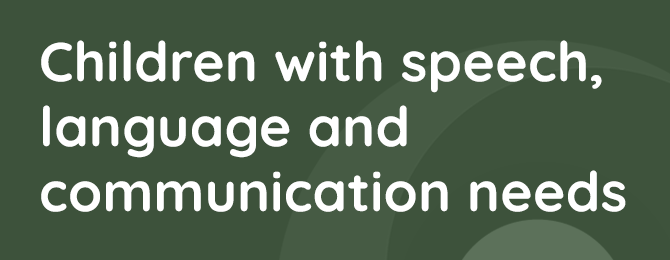I am worried about my child's speech, language and communication needs

Children with speech, language and communication needs (SLCN) require extra support to develop their communication skills and reach their full potential.
What are speech, language and communication needs?
SLCN is an umbrella term referring to difficulties with:
- Speech: articulating sounds, stuttering, voice problems
- Language: understanding and using vocabulary, grammar, and sentences
- Communication: expressing needs, interacting socially
SLCN affects 1 in 10 children in the UK.
Common causes of speech, language and communication needs include:
- Hearing problems
- Neurodevelopmental conditions, for example autism, ADHD
- Learning disabilities
- Physical or structural problems, for example cleft palate
- Environmental factors
Who can help me?
The Communication Interaction Team works with children and young people who have speech, language, and communication needs (SLCN). This includes children and young people with social communication needs and/or are on the Autism Spectrum (ASC) and children with Developmental Language Disorder (DLD).
Additionally, Livewell Southwest have a Children's Speech and Language Service that supports children aged 0-18 who have difficulty speaking clearly, expressing themselves, communicating socially, understanding others, talking fluently, or feeding and swallowing.
Tips for parents and carers
As a parent or carer, you play a vital role in your child's language development. Try these tips at home:
- Talk frequently to your child during daily activities
- Respond to their vocalisations; have back-and-forth 'conversations'
- Expand on their speech by repeating back longer sentences
- Read books together daily; discuss pictures and new words
- Limit screen time and prioritise face-to-face interaction
- Use simple, clear language; speak slowly; make eye contact
- Provide choices to encourage expressive language
- Model good speech and grammar, avoid baby talk
- Praise all communication efforts, don't demand perfection
- Seek support from speech therapy, parent groups, and teachers
Progress may seem slow but stay positive. Early intervention can make a lasting difference for children with SLCN. Consistent support across home, school, and the community provides the best environment for overcoming communication challenges and unlocking every child's potential.
Plymouth's Local Offer is organised into four main categories covering the following age ranges:
- Early years (0 to 5 years old)
- Primary (5 to 11 years old)
- Secondary (11 to 18 years old)
- Preparing for adulthood
Is the information correct?
Let us know if the information on this page is wrong and needs to be updated.






